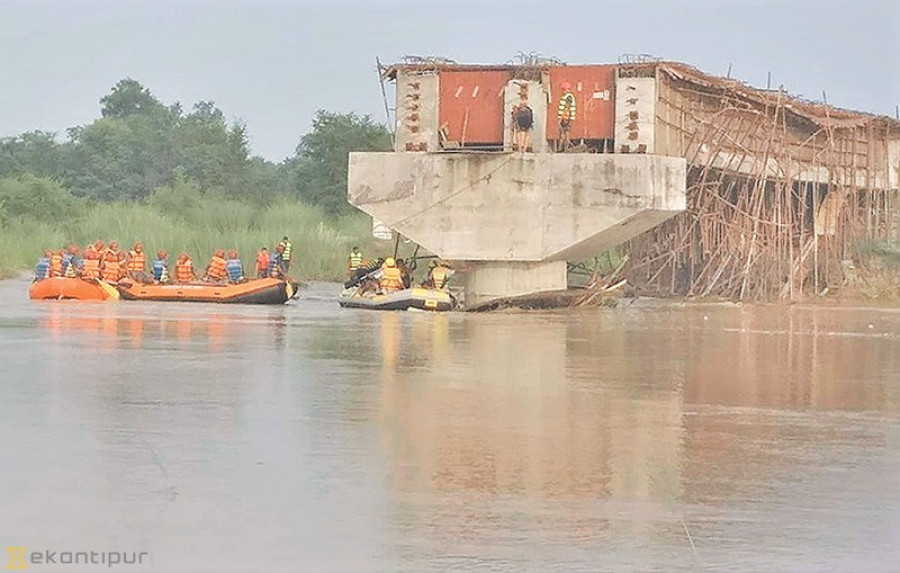Valley
Government amends procurement regulation allowing contractors to bid in projects beyond their scope
Latest amendment removes the provision introduced barely a month earlier to discourage contractors from occupying multiple projects at a single time
Prithvi Man Shrestha
Nearly a month after introducing a provision of barring contractors from participating in bids beyond their capacity, the government has reversed the decision, paving the way for contractors to occupy multiple contracts at a single time.
A single contractor firm occupying a large number of contracts going beyond its capacity has been one of the key reasons behind project delays. Through the latest amendment (seventh) to the Public Procurement Regula-tion, the government has removed the provision that was brought through the sixth amendment just a month ago.
The previous amendment stated that a contractor can participate in a bid only up to the amount four times of its average annual turnover in the past five years. The officials of the relevant government offices and the top leadership of the Federation of Contractors Associations of Nepal (FCAN), the umbrella body of contractors, have been surprised by a sudden change in the regulation.
They suspect the amendment was made to serve the vested interest of some contractors with poor track record— who are used to occupying many contracts at a time and failing to deliver them on time.
The Public Procurement Monitoring Office (PPMO) had already changed its software and amended the bid documents to implement the system in line with the sixth amendment. It had also prepared a sample format for assessment of contractors’ bidding capacity.
“We had proposed a provision of vetting the bidding capacity of contractors through the sixth amendment in order to stop the practice of a single contractor occupying a large number of contracts at a single time,” a senior official at the PPMO told the Post.
He claimed that the office was not consulted before making the seventh amendment to the regulation.
The government had published the new amendment made to the regulation in the Nepal Gazette on June 6.
A senior official at the Ministry of Physical Infrastructure and Transport, which mobilises the largest amount of development budget, also expressed surprise at the reversal of the provision.
“It was a very good provision which would have mounted pressure on contractors to complete the works related to existing contracts at the earliest in order for them to be able to participate in other bids. It could have helped the government to accelerate development works without taking legal action against under-performing contractors,” said the official.
Contractors such as Pappu Construction, founded by suspended lawmaker Hari Narayan Rauniyar, and Shailung Construction, owned by Sharada Prasad Adhikari, the landlord of ruling Nepal Communist Party Co-chairman Pushpa Kamal Dahal, have often been blamed for occupying a large number of contracts without completing them.
Since these two firms enjoyed political patronage, they managed to avoid action for violating the contract terms. Although FCAN was against the number of provisions made in the sixth amendment of the regulation, it had not demanded a reversal of the provision related to bid capacity.
“We had for long been demanding that contracts should be awarded based on bid capacity. We had just asked the government to widen the scope of bid capacity by enabling a contractor to get a contract up to seven times its annual turnover from four times as provisioned in the sixth amendment,” said FCAN President Rabi Singh. “But the entire provision related to bid capacity was removed which will once again help flourish the same anomalies created by a single contractor holding many contracts, which is unfortunate for our country’s development.”
Small contractors have expressed strong reservation on the latest amendment. They have also raised concerns over a provision in the seventh amendment that gives government the authority to decide whether a contractor facing corruption litigation should be allowed to bid in new projects.
In the sixth amendment, there was a provision of a blanket ban on contractors facing corruption cases from bidding in new projects unless it has been given a clean chit by a court.
“The new amendment encourages ministers and government officials to seek kickbacks in order to allow corruption-accused contractors to bid in new projects, since the government has been given the authority to decide who should or should not be allowed to bid,” said FCAN President Singh. “With this provision, the government could also decide to allow the contractors supporting the ruling party to participate in bids, while denying the contractors supporting opposition party.”
The main concern of the contractors when they protested against the sixth amendment was that a contract would not be extended for more than half of its original deadline.
The government relaxed this provision in the seventh amendment allowing the government secretary to extend the deadline by a maximum of one year if it appears that the project could be completed after the deadline extension.
“It would be enough if the government had amended this provision of the sixth amendment so that contract of the project having the progress of 70-80 percent would not be terminated,” said senior official at Physical Infrastructure Ministry.




 14.24°C Kathmandu
14.24°C Kathmandu














